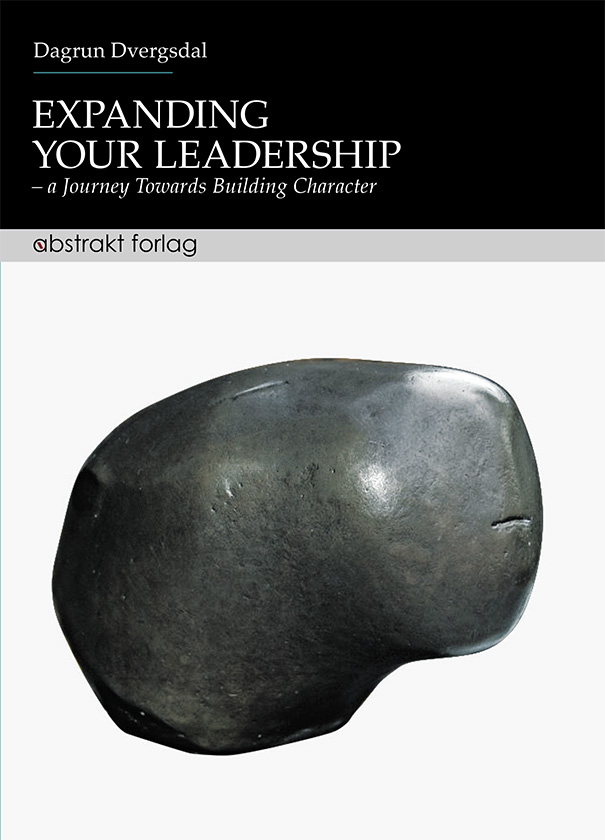Articles:
TRUST-BASED STEERING OF LARGE ENGINEERING-TO-ORDER OFFSHORE/ONSHORE PROJECTS: IS IT POSSIBLE?,
Article by Dagrun Dvergsdal and Trond Haga in the European Journal of Worklife Innovation. Vol 4, No2 (2019):
Click here
Trust-based steering of large engineering-to-order offshore/onshore projects: is it possible?
Artikkel om Dagrun Dvergsdal og DCas i Scan Magazine, utgave 101, juni 2017.06.18
Download.
Book releases:


Expanding Your Leadership
– a Journey Towards Building Character av Dagrun Dvergsdal
Read more / buy
Said about the book:
Simen Lieungh, Odfjell Drilling:
“Good leaders identify and trust their own values and develop from the inside. A leadership style based on something that is not you will fail when things get rough. This book is about the complex, demanding and enriching journey towards good leadership.”
David Ley, Jacobs:“I love the book – it really speaks the truth about leadership rather than management gobbledegook! A great strength of “Expanding Your Leadership” is that it provides a deep insight into the impact that the character of a leader can have on a team. It recognises that every leader is different, each with their own set of values and leadership qualities. Leaders therefore need to develop their own personal approach based upon building a deep understanding of the impact of their actions and behaviours on a team.”
Book Review by Nancy Hardaway, in Gestalt Review
Download review in Gestalt Review
Book review by professor Jan Ketil Arnulf, the Norwegian Business School (BI), in: Journal of the Norwegian Psychological Association, May 2015.
A courageous book
In a field dominated by big words and cheap recipes, Dvergsdal steers clear of the phraseologies and grabs hold of the most difficult parts.
Writing well about leader development is not easy. This field is dominated by people who try to make big money on a combination of bulging words and cheap recipes of sale. Here, Dvergsdal has taken another course, and she has written a courageous book. It is so because it has made an attempt to keep away from the phrases and taken hold of what is most difficult, namely changing the individual participants.
Concrete and open-hearted
At first sight the book presents itself as a straightforward recipe for how to plan and facilitate a leader development program. The 12 chapters consist of a concrete and detailed review of expectations, ownership, the people conducting the program (who Dvergsdal calls “the learning team”), the architecture of the program, the content and how it is run. In itself this will be useful for many readers. The book is more practical than theoretical, and the professional fundament is a combination of diverse angles with long traditions in Norwegian organizational development, the so-called “OD-perspective.”
At another level this is also a story-telling book. It is a pedagogic documentation of a comprehensive leader development program that actually took place in a major Norwegian industrial company. Documentation on leader development is scarce, not only in Norway but worldwide, so this story is valuable in itself. It may have limited value as evaluation in the strict sense, and it is not claiming such value. Nevertheless, it is of great importance in understanding how leader development has been planned and executed in industrial practical life. Such chronicles should come from more companies. This one is brave; both Dvergsdal and her customer are courageous in telling such an open story about the inner life of the program.
Counter forces
The most courageous part of the book, however, is Dvergsdal’s consequent will to stick to the aim of leader development to be character building. From the onset, the author describes the counter forces that will be encountered, and this becomes a recurring theme in the book. She describes how many agents run development programs as meaningless jippos of the Robinson expedition type. The reader gets to meet the top management leaders who willingly but superficially rather would wish that the consultants knew everything and just “did it” with the participants. And the reader can especially experience how all participants enter the program more or less defensively and with suspicion.
The counter forces continuously represent a pressure towards letting go of the personal and intimate, in order to replace it with flagrant words and illusions about the importance that is always connected to leading positions. Dagrun Dvergsdal’s book, however, supports the notion of leader development as a silent, positive process of construction, where participants towards the end of the program seem surprised about the resources they have discovered in themselves during the journey.
This is brave because the counter forces – the chasing after quick fix recipes for the super leader – is strongly represented also in the market for books on leader development. The risk connected to a book like this is that may appeal only to those who are already convinced, but be that as it may. This is a timely, sober description of good leader development in the world of realities.


Gruppeterapi
av Halvor Kjølstad
Download / Buy
Tailor-made development processes with people at the centre
© 2024 Dvergsdal Consulting.